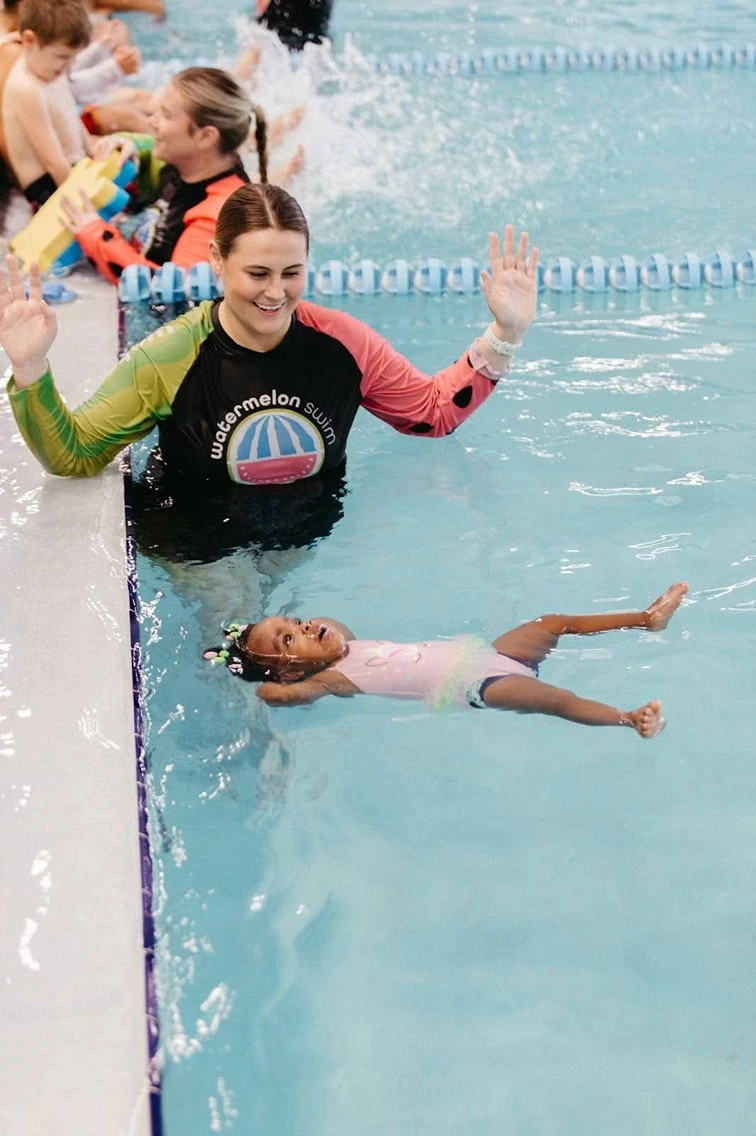Water Safety Week 2024: Raising awareness about drowning
Summer is approaching, meaning Water Safety Week is coming up! This annual event, held in May with National Water Safety Month, runs from May 13 to May 19, 2024. Water Safety Week is a campaign to raise awareness about water safety and drowning risks, especially for young children.
Water Safety Week is one of our favorite events at Watermelon Swim, as it aligns with our mission to grow a community of safer swimmers. We’ll help you and your child learn more about what you need to be safer and have fun in the water! Read our tips below and call one of our four indoor locations across the greater Tampa area at (813) 229-7946 for a tour and more information about our small-group swimming classes.
The importance of water safety
Drowning occurs when too much water enters the lungs, preventing the blood from getting enough oxygen. This oxygen deprivation affects the brain and the rest of the body in as little as two minutes.
Between the Gulf, the Bay, multiple rivers, retention ponds in every neighborhood, and a pool at nearly every other house, there are plenty of risks for children to drown or be injured in an aquatic accident. In a recent two-year period, Florida had the highest number of unintentional drowning death rates among children ages 1 to 4 years. This is why Drowning Prevention and Water Safety Week is important to families in our community.
Currently, the state is third in the nation for unintentional drowning death rate among children ages 0 to 17 years of age. Annually, there are enough children under the age of 5 lost to drowning to fill three or four preschool classrooms. These alarming statistics demonstrate just how important water safety is.
The four parts of Water Safety – Slyce’s Seeds of Water Safety
Learning about the four components of Water Safety is a great way to kick off National Water Safety Month; at Watermelon Swim, we call these four pillars Slyce’s Seeds of Safety. These components give children all the information they need to minimize the risk of accidental drowning.
1. Always follow water safety rules
- Always read posted signs (or have an adult read them for you)
- Only swim when a lifeguard is present
- Wear a life jacket or personal floaties if you need them
2. Never, ever swim alone
- Make it a family rule that no one swims alone so that your children get into the habit of bringing a buddy or trusted adult for safety each time they swim
- Swimming with friends or family is safer, so they can get help in an emergency
3. Help out, but do not jump in
- Call 911 for help and follow their instructions
- Shout for help to alert others around you
- Leave rescuing to lifeguards – do not try to rescue a drowning person if you aren’t trained
4. Wear a life vest
Important rules for water safety
Teaching children water safety rules early helps them form lifelong habits. Make each family rule short and simple for even the youngest child to remember.
- Never pretend to drown – drowning is not a joke.
- Wear protective footwear on uneven or rocky surfaces to prevent slipping into the water.
- Do not swim out too far in open water.
- When swimming in the ocean, always face toward the waves, not away from them.
- Make sure you know how to swim before entering open water.
Finally, although this isn’t necessarily a rule about safety in the water, it’s still important for safety around water. Do not bring glass containers to the beach or pool. Broken glass can be hard to see and poses a serious danger.
A few more tips for having fun and staying safer in the water
There are more dangers around water than just the water itself. These tips help ensure any water-based outing is fun and safer for everyone:
- Sun safety is water safety. Wear plenty of sunscreen and reapply regularly, especially after getting out of the water.
- Always designate a water watcher.
- Drink plenty of water, and bring more than you need. Swimming can easily dehydrate you.
- Get out of the water at the first sign of a storm – storms can develop quickly in Florida.
- Do not swim in the dark.
Resources to help teach children about water safety
Several fun Water Safety Week activities are planned for our students at Watermelon Swim. But water safety isn’t confined to a week – review the materials below whenever possible!
- Watermelon Swim’s FREE online Water Safety Education video is geared toward children from toddlers to elementary school
- WaterSmartFL’s Water Safety Is Everyone’s Responsibility initiative provides educational resources for children and adults on preventing accidental drowning

